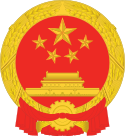Chairman of the Standing Committee of the National People's Congress
This article needs additional citations for verification. (March 2013) |
| Chairman of the Standing Committee of the National People's Congress of the People's Republic of China | |
|---|---|
| 中华人民共和国全国人民代表大会 常务委员会委员长 | |
 | |
| Type | Presiding officer |
| Appointer | National People's Congress |
| Term length | 5 years, renewable once consecutively |
| Inaugural holder | Liu Shaoqi |
| Formation | 27 September 1954 |
| Chairman of the Standing Committee of the National People's Congress | |||||||
|---|---|---|---|---|---|---|---|
| Traditional Chinese | 全國人民代表大會常務委員會委員長 | ||||||
| Simplified Chinese | 全国人民代表大会常务委员会委员长 | ||||||
| |||||||
| Officially abbreviated as | |||||||
| Traditional Chinese | 全國人大常委會委員長 | ||||||
| Simplified Chinese | 全国人大常委会委员长 | ||||||
| |||||||
Politics of China |
|---|
 |
|
The chairman of the Standing Committee of the National People's Congress is the presiding officer of the Standing Committee of the National People's Congress (NPCSC), highest organ of state power and top legislative body in the People's Republic of China (PRC). The incumbent chairman is Li Zhanshu.
From 1998 to 2013, the position was ranked second in China's political hierarchy since Li Peng was barred from seeking a third term as premier in 1998. In the political order of precedence, the chairman ranks below the General Secretary of the Chinese Communist Party and president. Since 2013 the chairman has ranked below the premier, Li Keqiang. The ranking of this position is not necessarily reflective of its actual power, which varies depending on the officeholder.
Powers[]
The position holds reserve constitutional powers under the 1982 revision of the Constitution of the People's Republic of China. As stipulated in Article 84 of the Constitution, should both the President and Vice-President become incapacitated, and the National People's Congress is unable to elect a timely replacement, the Chairman of the NPC Standing Committee will act as President.[1]
From 1975 to 1983, the Chairman of the Standing Committee served as head of state of the People's Republic of China, as the presidency had been written out of the 1975 constitution and was also excluded from the 1978 draft. Theoretically, during the 1989 Tiananmen Square protests, the NPC Chairman at the time, Wan Li, had the power to call an emergency session of the NPC to resolve the issue constitutionally. However, Wan's freedom of movement was restricted, and ultimately rendered powerless in the situation.
List of chairmen[]
Multiple terms in office, consecutive or otherwise, are listed and counted in the first column counts individuals and the second column (term number).
- Generations of leadership
- Mao Zedong Administration
- Deng Xiaoping Administration
- Jiang Zemin Administration
- Hu–Wen Administration
- Xi–Li Administration
| № | Chairman | Term | Took office | Left office | |
|---|---|---|---|---|---|
| 1 | 
|
Liu Shaoqi 刘少奇 |
1 | September 15, 1954 | April 28, 1959 |
| 2 | 
|
Zhu De 朱德 |
2 | April 28, 1959 | January 4, 1965 |
| 3 | January 4, 1965 | January 17, 1975 | |||
| 4 | January 17, 1975 | July 6, 1976 | |||
| — | 
|
Song Qingling 宋庆龄 |
July 6, 1976 (acting) |
March 5, 1978 | |
| 3 | 
|
Ye Jianying 叶剑英 |
5 | March 5, 1978 | June 18, 1983 |
| 4 | 
|
Peng Zhen 彭真 |
6 | June 18, 1983 | April 13, 1988 |
| 5 | Wan Li 万里 |
7 | April 13, 1988 | March 27, 1993 | |
| 6 | Qiao Shi 乔石 |
8 | March 27, 1993 | March 15, 1998 | |
| 7 | 
|
Li Peng 李鹏 |
9 | March 15, 1998 | March 15, 2003 |
| 8 | 
|
Wu Bangguo 吴邦国 |
10 | March 15, 2003 | March 15, 2008 |
| 11 | March 15, 2008 | March 14, 2013 | |||
| 9 | 
|
Zhang Dejiang 张德江 |
12 | March 14, 2013 | March 17, 2018 |
| 10 | 
|
Li Zhanshu 栗战书 |
13 | March 17, 2018 | Incumbent |
- Head of State (under the 1975 Constitution
& 1978 Constitution)
Timeline[]

References[]
- ^ "Constitution of the PRC". Archived from the original on 2008-11-20. Retrieved 2009-03-10.
See also[]
- Chairmen of the Standing Committee of the National People's Congress
- Legislative speakers
- Members of the Standing Committee of the National People's Congress


